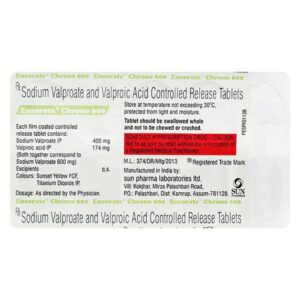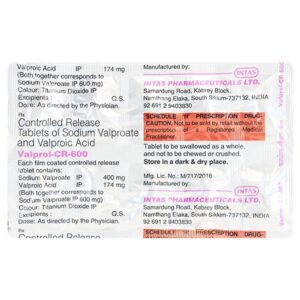SODIUM VALPROATE + VALPROIC ACID
Sodium Valproate: Sodium Valproate is a medication approved for use in treating various neurological conditions, including epilepsy, bipolar disorder, and migraine headaches. It is a type of anti-epileptic drug (AED) and belongs to the class of medications known as anticonvulsants or mood stabilizers.
The exact mechanism of action of Sodium Valproate is not fully understood. However, it is believed to work by increasing the levels of gamma-aminobutyric acid (GABA) in the brain, which is an inhibitory neurotransmitter. This helps to calm overactive electrical signals in the brain and reduce seizures or stabilize mood.
The dosage of Sodium Valproate depends on the condition being treated and the individual patient’s response. It is usually started at a low dose and gradually increased until an effective dose is reached. The drug is available in different forms, including tablets, capsules, and syrup.
Some common side effects of Sodium Valproate include drowsiness, dizziness, headache, nausea, vomiting, diarrhea, stomach pain, weight changes, hair loss, and tremors. These side effects are generally mild and temporary. However, there are also some potentially serious side effects, such as liver problems, pancreatitis, and rare but serious skin reactions. Regular monitoring of liver function is often recommended while taking Sodium Valproate.
It is important to note that Sodium Valproate may interact with other medications, including birth control pills, and can cause birth defects if taken during pregnancy. Therefore, it is crucial to discuss all current medications and any plans for pregnancy with a healthcare professional before starting this medication.
In conclusion, Sodium Valproate is a medication used to treat epilepsy, bipolar disorder, and migraine headaches. It works by increasing GABA levels in the brain to reduce seizures or stabilize mood. Although generally well-tolerated, it can cause side effects, and close monitoring is required due to potential serious effects on the liver and other organs.
Valproic Acid: Valproic Acid, also known as valproate, is a medication commonly used to treat various conditions, including epilepsy, bipolar disorder, and migraine headaches.
Its main mechanism of action is not fully understood. However, it is believed to increase the levels of a neurotransmitter called gamma-aminobutyric acid (GABA) in the brain, which helps calm excessive electrical activity and stabilize mood. Valproic acid also indirectly affects other neurotransmitters, such as dopamine and serotonin, which may contribute to its mood stabilization effects.
The dose of valproic acid depends on the condition being treated and the individual patient. It is usually started at a low dose and gradually increased to achieve the desired therapeutic effect. For epilepsy, the typical starting dose for adults is 10-15 mg/kg/day, divided into two or three doses. For bipolar disorder, the initial dose is usually around 750 mg/day, divided into two or more doses. The dose may be adjusted based on the response and tolerance of the patient.
Like all medications, valproic acid can cause side effects. Common side effects include nausea, vomiting, dizziness, drowsiness, tremors, and weight gain. These side effects are usually mild and go away on their own as the body adjusts to the medication. However, if they are persistent or severe, it is important to consult a healthcare professional.
Valproic acid can also have more serious side effects, although they are less common. These include liver problems, pancreatitis, low platelet count (increased risk of bleeding), and birth defects if taken during pregnancy. Regular blood tests are often required to monitor liver function and blood cell counts while taking valproic acid.
It is essential to follow the prescribed dose and schedule, as well as to communicate any concerns or side effects with a healthcare professional while taking valproic acid.






